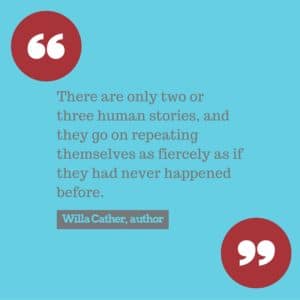By Taylor Martindale Kean
#TeamMoonsail is excited to announce the launch of our guest blog series. Each month, we’ll tap an expert in our networks to share their insights. This week, we asked literary agent Taylor Martindale Kean to share her storytelling and writing voice tips. Taylor is an agent with Full Circle Literary, and has discovered and represented critically-acclaimed young adult authors such as Emery Lord (When We Collided), Anna-Marie McLemore (The Weight of Feathers), Annie Cardi (The Chance You Won’t Return), and Aisha Saeed (Written in the Stars). You can follow Taylor on twitter @TMartindaleKean.
 I have a favorite quote, from author Willa Cather, who wrote incredible and important fiction and nonfiction in the first half of the 20th century—most notably novels like My Ántonia, O Pioneers!, and Pulitzer Prize-winning One of Ours. She said, “There are only two or three human stories, and they go on repeating themselves as fiercely as if they had never happened before.
I have a favorite quote, from author Willa Cather, who wrote incredible and important fiction and nonfiction in the first half of the 20th century—most notably novels like My Ántonia, O Pioneers!, and Pulitzer Prize-winning One of Ours. She said, “There are only two or three human stories, and they go on repeating themselves as fiercely as if they had never happened before.
I have always loved this quote. It has always spoken to me as the clearest statement that it doesn’t matter which story you’re telling, but how you’re telling it, how fiercely the characters are experiencing their own story, how genuinely you’re connecting to your audience. But how to make your story achieve this level of connection?
In the publishing world, we are constantly talking about voice. When agents and editors are looking for new authors and exciting books to sign up, we are looking to see how a project can stand out from its competitors. How does it differ from similar books? What will make it strongly unique? And most importantly, how is it going to engage the audience and pull readers in from the first page?
There is a balance to storytelling, of course there is! Readers want to see a compelling story, characters they can connect with and root for, a plot that is paced correctly and keeps the story moving. But how many of you have read something where you didn’t particularly like the character, or maybe thought the story was familiar, but you still couldn’t get enough of it? Me, too. That’s voice. It’s the mysterious x-factor that keeps readers begging to turn the page, to get more from that author.
And here’s the best part: it’s not mysterious. Just like any other writing element, it is a skill to be learned, constantly practiced, and continually strengthened. Voice is your brand, the identity and tone you infuse into your writing. It is the personality and emotion you bring to your work. Voice builds a sense of character and narrator, and it’s the author’s stamp on a work. It’s the element that allows a work to be cohesive and emotional. Voice is also subjective, and that’s all right. Some readers are going to enjoy your narrative voice, and some might not connect with it as strongly. That’s okay. Part of developing voice is learning how to pull in your audience, not every audience.
When I talk to authors about how they can develop voice in their work, there are five elements I highlight. A great voice can be any combination of these elements—sometimes one at a time, a few at a time, or all at once. Here are, in my opinion, the top five elements of great voice. (Disclaimer: these are geared toward fiction writing, but can easily be applied to any style or work!)
- Be specific: Generalization won’t create a strong start for your voice. I want to hear what’s important and noticeable to this narrator, not everything that may or may not be connected.
- Be sensory: Make sure you’re using the 5 senses. This keeps your voice rich and vibrant.
- Be authentic: The narrative voice of your manuscript should be authentic to your character/narrator, and your characters themselves need to be individualized.
- Be immersive: Use voice to keep your reader immersed in your characters’ experiences and emotions. Don’t let readers detach from the moment—i.e. Don’t let your reader hear ‘your’ thoughts (as the author). Make them stay connected to your narrator.
- Be authoritative: Your voice needs to have authority, allowing the reader to trust that your narrator is the right one to tell the story.
Voice can take some time to develop. The authors I work with create a unique voice for each character, while also building their particular brands as authors. It’s something that should take work, and some projects will be easier than others. But don’t ever give up on it. The work to create a fresh, unique, compelling voice will never be wasted. And your audience will thank you for it.
 Taylor Martindale Kean
Taylor Martindale Kean
Literary Agent, Full Circle Literary
@TMartindaleKean
www.fullcircleliterary.com



